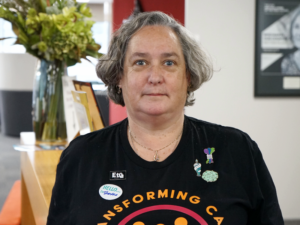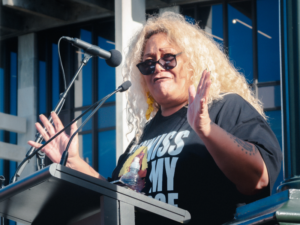Care and support workers betrayed – but not standing down
In May, the Government passed urgent legislation that brought a sudden and brutal end to 33 live pay equity claims across the country, including the long-awaited new claim for care and support workers.
The new law was rushed through Parliament without public consultation or Select Committee scrutiny. It not only scraps the claims already in progress, but also rewrites the rules to make it significantly harder for new claims to even begin. Care and support workers, who had spent nearly three years waiting for a renewed settlement, have been told have now been told they can’t even start a new claim until 2027.
The impact is devastating. These are frontline workers supporting disabled people, older New Zealanders, and a range of others who need care and support. They are overwhelmingly women, many of them Māori, Pasefika, and migrants. They’ve always been underpaid as a result of systemic gender-based discrimination.
The previous pay equity settlement, won in 2017, was a historic step forward. It lifted wages across the board and recognised the systemic undervaluation of care and support work.
However, that agreement expired in 2022. Since then, costs have skyrocketed, workloads have intensified, and workers have been told to wait – for legislation, for funding, for political will. Now, that wait has ended in betrayal.

Tamara Baddeley
Tamara Baddeley, home support worker and Convenor of the E tū Community Support Services Industry Council, says the decision has enraged and energised members in equal measure.
“This makes me feel f***ing angry. This Government is a nest of vipers – they speak with a forked tongue,” Tamara says.
“I challenge every single one of them to come and work with us. On our wages. Getting assaulted at work, paying for travel out of your own pocket. Then tell us why cutting off our pay equity claim is a good idea.”
“Our claim had been sitting there for well over 1,000 days. Why are we still waiting?
We’re fighting back
The Government may have hoped to shut this down quietly, but they underestimated the determination of everyone who believes in justice for women, and for all workers in women-dominated industries. Immediately after the announcement, dozens of rallies were organised across the country organically. From Whangarei to Gore, people met to use their voices together to express their rage.
On Budget Day, thousands gathered outside Parliament. E tū members held a stopwork meeting, alongside other unions and many other supporters, calling out the theft of pay equity and demanding respect for the work they do.

Jo-Chanelle Pouwhare
Jo-Chanelle Pouwhare, a disability support worker, was one of the speakers at the Wellington rally.
“I’ve had to come here to remind this Government that New Zealand was the first place in the world to allow women to vote. And yet, this is what they’ve diminished us to. Shame on them,” Jo-Chanelle said.
“This Government needs to understand that we are worth every cent, and more, than was in those pay equity claims. Trust and believe.
“Let’s fight this fight. Let our voices be heard. Stand proud of who you are, I’m proud of you and us.”
Since then, momentum has only grown. A new People’s Select Committee has been launched, led by former MPs and supported by unions, to give workers the voice they were denied in Parliament. The committee is collecting stories from across the country and preparing a report to show the real human cost of cutting pay equity.
Delegates are organising workplace meetings, communities are rallying around their local support workers, and submissions are pouring in. What was meant to be quietly buried has become a national conversation, and E tū members are leading it.
